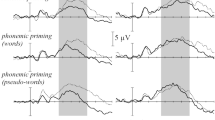Abstract
The aim of this study was to investigate the effect of lexical context on the latency and the amplitude of the mismatch negativity (MMN) brain potential caused by perception of pseudowords. The eventrelated potentials were recorded according to the multideviant passive odd-ball paradigm by using only pseudowords (control condition) or pseudowords with Russian words with different lexical frequencies (lexical context). It was found that different MMN patterns were generated when the same pseudoword was presented in different contexts. Pseudoword presentation in a context with other pseudowords resulted in a relatively small amplitude and large latency of MMN. If the same pseudoword was presented in a context with words, it induced significantly increased amplitude and reduced latency of MMN varying in the range of 100–200 ms. It is supposed that the pseudoword presented in a context with words is perceived as conceptually different stimulus, which leads to a significant increase in MMN. Moreover, our findings support the hypothesis that MMN is affected by lexical frequency. In particular, presentation of a high-frequency word induced a significantly more pronounced MMN response than a low-frequency one. High-frequency words also evoked earlier response, which indicates more rapid access to a frequently used lexical entry. More frequent use of certain words results in stronger internal connections in the corresponding memory circuit, which in turn is determined by the lexical context. We hypothesize that different intensities of activation depends on the strength of lexical representation.
Similar content being viewed by others
References
Näätänen, R., Lehtokoski, A., Lennes, M., et al., Language-specific phoneme representations revealed by electric and magnetic brain responses, Nature, 1997, vol. 385, p. 432.
Alexandrov, A.A., Boricheva, D.O., Pulvermüller, F., and Shtyrov, Yu., Strength of word-specific neural memory traces assessed electrophysiologically, PLoS One, 2011, vol. 6, no. 8, p. e22999. doi 10.1371/journal. pone.0022999
Tamminena, H., Peltolaa, M.S., Kujalad, T., and Näätänen, R., Phonetic training and non-native speech perception–new memory traces evolve in just three days as indexed by the mismatch negativity (MMN) and behavioural measures, Int. J. Psychophysiol., 2015, vol. 97, no. 1, p. 23.
Davis, M.H. and Gaskell, M.G., A complementary systems account of word learning: Neural and behavioural evidence, Philos. Trans. R. Soc., B, 2009, vol. 364, no. 1536, p. 3773.
Aleksandrov, A.A., Memetova, K.S., Stankevich, L.N., and Uplisova, K.O., The effect of the word frequency in Russian Language on mismatch negativity (MMN) in the event related potentials (ERP), Ross. Fiziol. Zh. im. I.M. Sechenova, 2016, vol. 102, no. 6, p. 717.
Näätänen, R., Pakarinen, S., Rinne, T., and Takegata, R., The mismatch negativity (MMN): Towards the optimal paradigm, Clin. Neurophysiol., 2004, vol. 115, no. 1, p. 140.
Pakarinen, S., Takegata, R., Rinne, T., et al., Measurement of extensive auditory discrimination profiles using the mismatch negativity (MMN) of the auditory eventrelated potential (ERP), Clin. Neurophysiol., 2007, vol. 118, no. 1, p. 177.
Shtyrov, Y., Kujala, T., and Pulvermüller, F., Interactions between language and attention systems: Early automatic lexical processing?, J. Cognit. Neurosci., 2010, vol. 22, no. 7, p. 1465.
Evstigneeva, M.D. and Aleksandrov, A.A., Mismatch negativity: contribution of difference in refractoriness of stimulus-specific neuronal populations, Ross. Fiziol. Zh. im. I. M. Sechenova, 2008, vol. 94, no. 10, p. 1147.
Evstigneeva, M.D. and Aleksandrov, A.A., Mismatch negativity: The contribution of differences in the refractoriness of stimulus-specific neuron populations, Neurosci. Behav. Physiol., 2009, vol. 39, no. 9, p. 833.
Lyashevskaya, O.N. and Sharov, S.A., Chastotnyi slovar’ sovremennogo russkogo yazyka (na materialakh Natsional’nogo korpusa russkogo yazyka) (Frequency Dictionary of Modern Russian Based on the Materials of the National Body of the Russian Language), Moscow: Azbukovnik, 2009.
Näätänen, R. and Alho, K., Mismatch negativity–the measure for central sound representation accuracy, Audiol. Neurootol., 1997, vol. 2, no. 5, p. 341.
Musatov, V., Russkii yazyk. Fonetika. Fonologiya. Orfoepiya. Grafika. Orfografiya (Russian Language. Phonetics. Phonology. Orthoepy. Graphics. Orthography), Moscow: Flinta, 2012.
Shtyrov, Y. and Pulvermuller, F., Neurophysiological evidence of memory traces for words in the human brain, NeuroReport, 2002, vol. 13, no. 4, p. 521.
Shtyrov, Y., Neural bases of rapid word learning, Neuroscientist, 2012, vol. 18, no. 4, p. 312.
Hawkins, E., Astle, D.E., and Rastle, K., Semantic advantage for learning new phonological form representations, J. Cognit. Neurosci., 2015, vol. 27, no. 4, p. 775.
Tiitinen, H., May, P., Reinikainen, K., and Näätänen, R., Attentive novelty detection in humans is governed by pre-attentive sensory memory, Nature, 1994, vol. 372, p. 90.
Shestopalova, L.B., Petropavlovskaia, E.A., Vaitulevich, S.Ph., and Nikitin, N.I., Contextual effects on preattentive processing of sound motion as revealed by spatial MMN, Int. J. Psychophysiol., 2015, vol. 96, no. 1, p. 49.
Shtyrov, Y. and Lenzen, M., First-pass neocortical processing of spoken language takes only 30 msec: Electrophysiological evidence, Cognit. Neurosci., 2017, vol. 8, no. 1, p. 24. doi 10.1080/17588928.2016.1156663
Strotseva-Feinschmidt, A., Cunitz, K., Friederici, A.D., and Gunter, T.C., Auditory discrimination between function words in children and adults: A mismatch negativity study, Front. Psychol., 2015, vol. 6, p. 1930.
Scharinger, M., Bendixen, A., Trujillo-Barreto, N.J., and Obleser, J., A sparse neural code for some speech sounds but not for others, PLoS One, 2012, vol. 7, no. 7, doi 10.1371/journal.pone.0040953
Scharinger, M., Monahan, Ph.J., and Idsardi, W.J., Linguistic category structure influences early auditory processing: Converging evidence from mismatch responses and cortical oscillations, NeuroImage, 2016, vol. 128, p. 293.
Author information
Authors and Affiliations
Corresponding author
Additional information
Original Russian Text © A.A. Aleksandrov, K.S. Memetova, L.N. Stankevich, 2017, published in Fiziologiya Cheloveka, 2017, Vol. 43, No. 4, pp. 47–56.
Rights and permissions
About this article
Cite this article
Aleksandrov, A.A., Memetova, K.S. & Stankevich, L.N. Lexical context affects mismatch negativity caused by pseudowords. Hum Physiol 43, 395–403 (2017). https://doi.org/10.1134/S036211971704003X
Received:
Published:
Issue Date:
DOI: https://doi.org/10.1134/S036211971704003X




